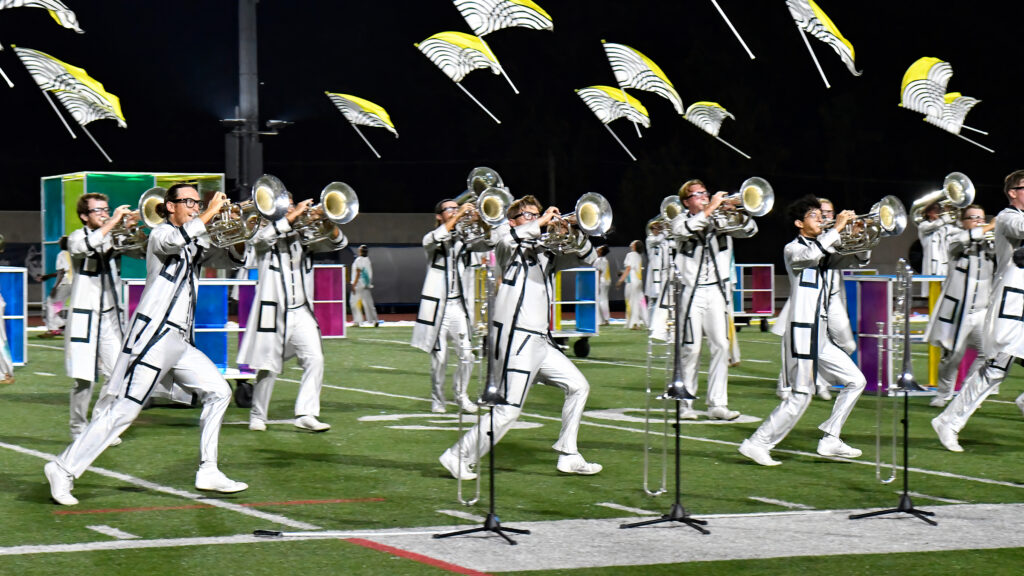Ensembles across the Drum Corps International landscape have a message for aspiring performers.
It doesn’t matter if you’ve marched before. It doesn’t matter what instrument you play. It doesn’t matter how long you’ve been involved in music. If you’re willing to learn, work, grow and adapt, there’s a place for you in a drum corps.
“We’re actively looking for students who have the right kind of attitude to be a part of a drum corps setting,” Seattle Cascades corps director Ray Severns said. “We’re going to take a student who wants to be educated, who is in it to get better, over a student who has a bad attitude but performs at a high level.”
For all drum corps, education is a key component of programming. Throughout the fall, winter and spring “offseason” months, amidst the process of fielding auditions from prospective corps members, corps will provide educational materials and services to grow the skills of both their members and their interested auditionees.
At many organizations, though, a ground-up education is quintessential to their mission.
“We put the education of our students first,” Severns said. “That ‘improvement every day’ sort of mantra is a big part of what we’re about. That’s really what we’re trying to build the foundation of everything we’re doing on.”
Experience level can vary from drum corps to drum corps, and many corps — especially those with a younger overall membership — make it a point to teach and work with interested performers to learn their preferred instrument and learn the drum corps activity.
And when drum corps say it doesn’t matter what kind of experience you have, they mean that across the board.
You can be brand-new to music. You can have music experience, but no marching experience. You can even play an instrument that differs from the instruments allowed by rules in the competitive drum corps activity.
Ultimately, drum corps staff members are often full- or part-time music teachers with a well of experience and training in education, and they have the skills to teach the various forms of drum corps performance to anyone interested.
“Let’s say they’re a saxophone player or a clarinet player with a dream of taking part in DCI,” said Rich Klimowicz, Jersey Surf director of operations. “We’ll have them audition on their clarinet or their saxophone, just so we can get a feel for their musicianship. And then we’ll work with them, if they’re willing to put in the effort, to get them to learn a brass instrument and to improve their skills to achieve their personal goals of participating at the World Class level.”
“I’ve had several students who have never marched before, or have never played a brass instrument, or spun a flag or done whatever they were trying to do prior to the season,” added Colt Cadets brass caption head Kara Metzger. “We’re really just taking individuals and making them into great musicians and great marchers.”
In many cases, too, education plans will be personalized to members based on their own unique situations.
“It’s really about having realistic expectations and being able to use the experience of the educational staff to create a success plan for each performer, individually,” Klimowicz added.
“We try to really teach them that this is a journey,” Blue Devils C percussion caption head Mike Reppucci said. “It’s not an instant gratification thing. It’s an amazing thing to watch, to see them grow over the course of time.”
So, what does that process look like? There are plenty of valid unknowns about auditioning for and starting out with a drum corps, and in many cases, those can be answered by any corps when it receives interest forms from prospective members.
The fact is, audition processes vary across the drum corps activity. Some corps will have various audition opportunities by section. Others will be mainly virtual, prior to in-person callback camps. Many have their own unique blend of the two.
But once a performer has expressed interest in a corps, whether that performer ultimately receives a spot in said corps or not, they’ll have the opportunity to work with corps educators both in large-group and one-on-one settings, and get a taste for the day-to-day of the drum corps experience by way of single-day and weekend-long in-person rehearsal camps.
“We provide an experience — the goal is that we’re taking you from a day in the life of drum corps,” Metzger said. “What’s it going to look like? Well, we’re going to get up, we’re going to do the food, we’re going to do the visual rehearsal, we’re gonna do more food, and then the music rehearsal, and then an ensemble rehearsal.”
As it pertains to a student’s own perceived talent or experience level, many corps often notice a trepidation from young performers regarding their likelihood of earning a spot in a DCI drum corps.
“Drum Corps International has grown to the point where ‘Marching Music’s Major League’ is kind of a known thing,” says Stephanie Dutcher, assistant corps director of the Jersey Surf. “One of the weird side effects of that is that a lot of great potential members think they’re not worthy, like, ‘Oh, I could never be in DCI.’ They watch a rehearsal or a performance and they’re like, ‘Oh, there’s no way I could ever do that.’”
But the product that takes place on the field at a DCI Tour event isn’t just the manifestation of members’ abilities. It’s the combination of hard work, consistent willingness to grow and learn, and a positive, cooperative attitude with trained educators.
“The bottom line is that the whole purpose of drum corps is to not only celebrate music, education and marching music specifically, but also to instill a lifelong love of performance and music-making,” Dutcher continued. “Groups across all of the divisions really want people who are dedicated, willing to work hard and who want to contribute to a team that all shares the common goal of pursuing their ultimate performance.”
So, why be so flexible? Why do drum corps find it important to work case-to-case to welcome and teach performers regardless of their background?
Simply put, they believe in the value of the drum corps experience. And they invite you to come to see why.
“I think drum corps was the best education I could ever have,” Reppucci said. “I learned more from drum corps and I have had more success in business and in work because of drum corps versus my education, because of all the other things that it taught me that you don’t learn in school.”

























































